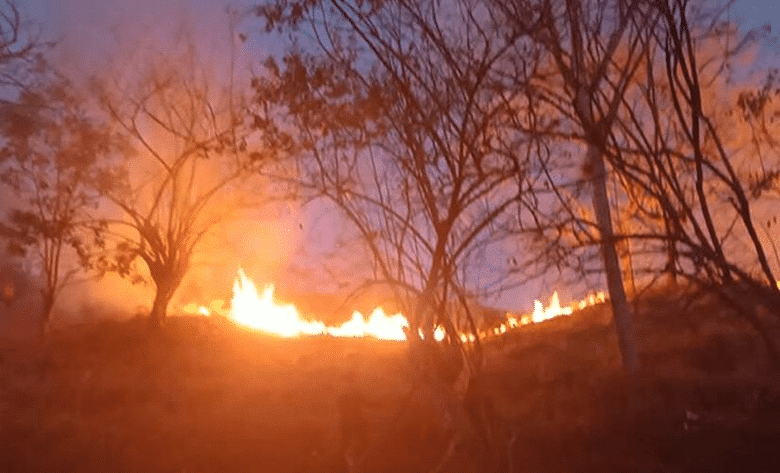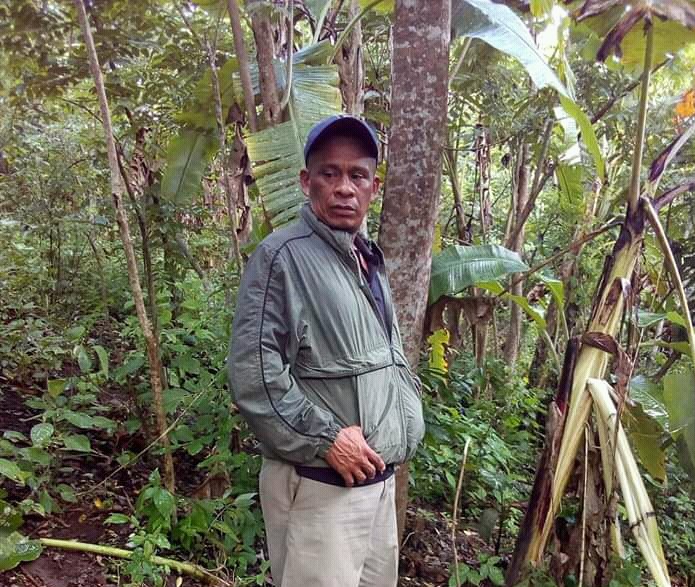5 de junio 2019

Nicaragua Records 888 Forest Fires So Far in 2024

PUBLICIDAD 1M
PUBLICIDAD 4D
PUBLICIDAD 5D
Accused of terrorism, arson, aggravated robbery and obstructing public services to the detriment of the State, he is in prison since March 7.

Radio journalist Marlon Powell
Journalist Marlon Jeronimo Powell Sanchez knew that the regime would go after him. The communicator fled from his native Masaya, an hour before the police and paramilitary forces of Ortega took armed control of the city on July 17, 2018.
However, it wasn’t until March 7, 2019 that the Police were able to arrest the reporter, who became the third journalist illegally imprisoned for his critical position against the government of Daniel Ortega and Rosario Murillo.
Powell produced the radio program “The finger on the sore,” in which he criticized the Ortega regime. He is currently being held in the La Modelo prison, where journalist Miguel Mora (Director of 100% Noticias) is also incarcerated, illegally detained in December 2018, along with his colleague Lucia Pineda Ubau, who is in the women’s La Esperanza prison.
The day that Powell fled, the police and the regime’s paramilitaries launched an operation of at least seven hours in Masaya. It was part of their “Operation Clean-up,” which left dozens of dead and hundreds of wounded in various departments of the country.
Powell fled along paths with a group of 30 citizens, that had participated in the civic demonstrations in Masaya. “They spent the night in the bush, slept on the ground and covered themselves with leaves, so they wouldn’t be discovered,” said a relative of the radio journalist, who requested anonymity for fear of reprisals by Sandinista sympathizers.
Beaten during capture
The journalist was in safe houses in Leon, Estelí and Managua, where he was illegally detained last March 7th, in the “San Judas” neighborhood. Powell spent 53 days in the cells of the infamous El Chipote interrogation prison. There he was isolated and without receiving the food [brought by his family], denounced national human rights organizations.
“The day he was captured they hurt him a lot, he was beaten brutally. He was unconscious for eight days, until the ninth or tenth day he recovered consciousness of where he was, who he was, and he became aware that he was imprisoned and what was happening to him,” commented the relative.
She added that in “El Chipote he spent a lot of time in an isolation cell, which was small, dark, and almost without ventilation. He has always been in dungeons, living inhumanly.”
At the Court
Powell was presented at an initial hearing last May 1. He is accused of the crimes of terrorism, arson, aggravated robbery and obstructing public services to the detriment of the Public Ministry and the Attorney General’s Office.
Elton Ortega, Powell’s defense lawyer, indicated that his client was presented until that date because the Prosecutor’s Office did not have the “evidence” of the facts, although after so much time they presented a “botched charge, with many deficiencies and even now we still don’t know what the supposed elements of proof are.”
“The Prosecutors had enough time to investigate and, if that was the case, to formulate (an accusation), but since they are criminalizing the protests and persecuting people that raise their voice, the first thing they do is detain, poorly investigate and then accuse,” he described.
Powell is accused along with Humberto de Jesus Perez Cabrera and Felipe Santiago Vazquez Hondoy, arrested last December. Also implicated by the prosecution are Emmanuel Salvador Arias Martinez and Francisco Roman Navas Galan, who are fugitives.
The relative described the indictment as “ridiculous,” since the Prosecutor’s Office does not have any proof of the facts and, furthermore, Powell does not even know the people with whom he is linked to.
Leader of the barricades
According to the Prosecutor’s Office, Powell was also the leader of one of the barricades in Masaya, between April and July 2018. The indictment indicates that the barricades were put up by some 200 people, not yet identified because they were hooded.
Presumably, from those barricades, the journalist ordered the looting of equipment and furniture from the Prosecutor’s Office in Masaya, premises that later, according to the indictment, he ordered to burn down.
For the defense lawyer, the imputation of crimes “follows the pattern of the Public Ministry to criminalize the protests, since the “indictment is deficient because it does not indicate which behaviors are attributed to each of the accused persons, but rather refers globally to three events which occurred at three different times.”
The indictment states that on May 10, 2018, more than 200 individuals entered by force and broke the doors of the Prosecutor’s Office. Later, on the 14th and 28th of the same month, both institutions were looted and finally burned.
Powell’s attorney emphasized that the Prosecutor’s Office “makes a superficial story of the evidence” and that this is based mainly on the testimony of the so-called “Code One”, which is an undercover police agent. “This is the figure they have used in all prosecutions of political prisoners, they put a hooded policeman to say what the indictment says, but it is not subjected to confirmation, ascertainment or verification.
In punishment cells
Relatives and organizations defending human rights have reported that the journalist has spent a lot of time in punishment cells. After his preliminary hearing, on May 1, he was punished because he protested in front of judge Karen Chavarria, head of the Ninth Criminal District Court of Managua, and did not want to sign the minutes of the hearing.
“When he returned to the (Penitentiary) System he was changed to the punishment regime and taken to cell 001, and in that cell he has lived an ordeal,” affirmed Powell’s family member, who added that the journalist was held with ten other political prisoners in a “small cell, dark and without ventilation.” On one side of the toilet was a kind of kitchen, to cook your food with a stench.”
The family member stressed that in that punishment cell, Powell “threw himself on the floor and put his nose on the slit that was between the floor and the door, trying to breathe so as not to collapse because he has claustrophobia.”
In the Little Hell
The lawyer Julio Montenegro, of the Permanent Commission of Human Rights (CPDH), reported on twitter that Powell, along with other political prisoners was moved to Gallery 300, also known as “El Infiernillo” (Little Hell).
The transfer occurred on May 11 and 12. The “Infiernillo” is a maximum security cell in which more than a dozen political prisoners have been confined.
The journalist’s relative said that the stay in “El Infiernillo” is “like being locked in a sauna, but without air, and without sun or artificial light. The heat is unbearable and there is no room to walk, it is something very small.”
In addition, she emphasized that Powell “is full of blisters caused by mosquito bites and is sick, with a lot of cough, which if not attended could worsen his health condition.”
Political negotiations
Powell’s initial hearing was scheduled for May 13, but judge Chavarría rescheduled it. The Prosecutor’s Office requested the postponement on the grounds of “force majeure.”
The lawyer said that the hearing was not carried out because the prison authorities did not transfer the accused to the Judicial Complex, so “technically” there is an impasse in the process. “Unofficially, we can deduce that they were not transferred because there are still talks between the Civic Alliance and the Government.
The lawyer added: “It is understandable that the processes don’t advance, because it would be lacking in logic, that you continue with the judicial dynamic if you are trying to find a viable solution to these legal processes.
The government keeps blocking the negotiations by refusing to comply with the agreements it signed on the release of political prisoners and the restoration of civic freedoms, such as the right of expression and demonstration. They demand that first the Civic Alliance must request the suspension of possible international sanctions against Nicaragua, especially the Nica Act.
Thank you for reading our English section, brought to you in collaboration with Havana Times. If you wish to subscribe to our English Weekly Newsletter, you can do it here. Please spread the word and share this link with your friends, family or contacts.
Regards,
Archivado como:
PUBLICIDAD 3M
Confidencial es un diario digital nicaragüense, de formato multimedia, fundado por Carlos F. Chamorro en junio de 1996.
PUBLICIDAD 3D